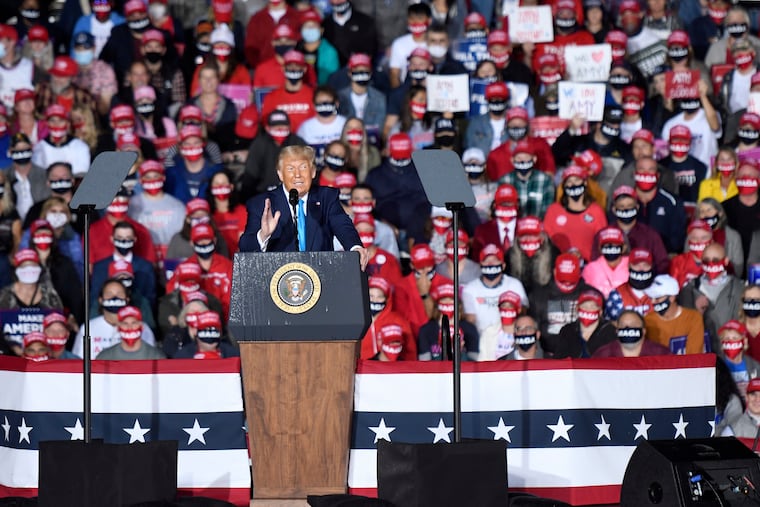Pa. crowd limits are in effect again after court order, though Wolf hints he’s considering fans at school sports events
Thursday's ruling means Pennsylvania gatherings are again limited to 25 people indoors and 250 outdoors — at least until the court decides whether the order is constitutional.

A federal appeals court restored crowd-size limits in Pennsylvania on Thursday, issuing an order that temporarily reinstates one of Gov. Tom Wolf’s key coronavirus mitigation measures until the court battle over whether they are legal is resolved.
The restrictions, along with other parts of the governor’s coronavirus strategy, had been ruled unconstitutional last month by a federal judge in Pittsburgh who declined to leave the crowd limits in place while Wolf challenges the ruling.
The order from the U.S. Court of Appeals for the Third Circuit on Thursday reversed that court’s decision, meaning gatherings in Pennsylvania are again limited to 25 people indoors and 250 outdoors — at least until the appeals court decides whether the order is constitutional.
The two-page order from the panel of three judges did not include a legal opinion explaining their reasoning, and the Third Circuit offered no indication of how quickly it would move to rule on the Wolf administration’s appeal.
The governor applauded the order.
“We have to recognize that we have a virus out there. And I don’t like it, you don’t like it, no one likes it, and yet, that virus is out to get us,” Wolf said at a news conference in Chester County. “So we have to be careful about how we gather together.”
The decision marked the latest turn in a challenge to the Democratic governor’s coronavirus mitigation measures brought by four Western Pennsylvania counties — Butler, Fayette, Green, and Washington — as well as individual businesses and lawmakers who contend components of his pandemic strategy are overreaching.
» READ MORE: Catch up: Wolf’s COVID-19 business closures, limit on gatherings unconstitutional, federal court rules
Now that the limits are back in place, Wolf indicated a willingness to compromise: He said Thursday he was working with school districts to reconsider crowd sizes at high school sporting events, which had become a flash point in the debate over the state’s restrictions.
Last week, he vetoed a bill that would have allowed school districts to decide their own crowd limits. State House Republicans, who tried but failed to override the veto, maintained Thursday that a governor or court should not decide crowd sizes, especially for school sporting events.
“This is a disappointing, but not surprising decision,” said Jason Gottesman, spokesperson for House Majority Leader Kerry Benninghoff (R., Centre and Mifflin), in response to the court order. “We continue to agree that the Governor’s congregate gathering limitations are unconstitutional and that local control over these decisions allows for the best response and takes into account geographical differences in how the virus has hit Pennsylvania.”
Neighboring states have similar regulations limiting crowd sizes, some stricter and others more lenient than Pennsylvania’s.
In New Jersey, indoor gatherings are also restricted to a maximum of 25 people, with an exception allowing up to 150 for events such as weddings and funerals. Outdoors, up to 500 people are permitted. New York restricts all social gatherings to 50 people and Delaware allows up to 250 people inside and outside.
Pennsylvania’s limits, though “well-intentioned,” violated the First Amendment right to assemble, U.S. District Judge William S. Stickman IV ruled on Sept. 14. He also found other parts of the governor’s mitigation strategy unconstitutional, including the temporary shutdown of businesses and the state’s stay-at-home orders.
The ruling did not apply to the state’s face mask mandate, which remains in effect.
But in the weeks since Stickman’s decision, some school districts in the state took advantage of the opportunity to allow more fans to watch high school football games.
Wolf said Thursday that the outdoor limit could change, saying when asked about fans hoping to attend a high school football game that his office was “working on it as we speak.” He said he recognized that “the contexts are different in every community.”
“I am listening to folks and continue to change as I did with restaurants,” Wolf said, “and will continue to make sure the guidelines we have in place are reasonable.”
The decision came amid a steady increase in confirmed coronavirus cases in both Pennsylvania and New Jersey, largely traced to college students clustering at parties and disregarding social distancing measures since returning to campuses this fall. The average number of new daily cases in the commonwealth was up to 918 on Thursday, a roughly 40% increase from 650 on Aug. 31.
Pennsylvania reported 1,156 new cases and 18 deaths on Thursday. In Harrisburg, the state House canceled its planned session after Rep. Paul Schemel (R., Franklin) tested positive for the virus.
New Jersey reported 663 new cases and five deaths. Monmouth University closed its campus after reporting 36 new cases this week, even though the school offers most of its classes remotely.
-Staff writers Jeremy Roebuck and Rob Tornoe contributed to this article.